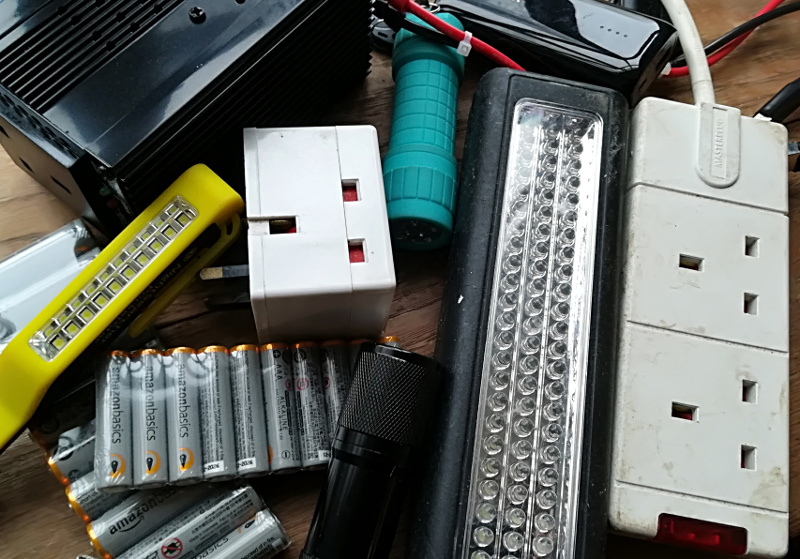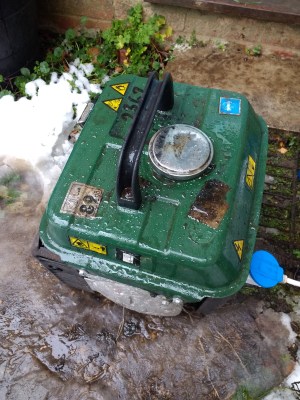When the mains power goes, we are abruptly brought face-to-face with how many of the devices and services we take for granted rely upon it. Telephones for instance, where once they were attached to the wall by a cable, now they are a cordless device with a mains-powered base station. Your cellphone can fill that gap, but a modern smartphone with a battery life of under a day is hardly a reliable long-term solution. Meanwhile modern heating systems may still burn gas or fuel oil, but rely on an electric pump for circulation. Your kitchen is full of electrically-powered white goods, your food is preserved by an electric refrigerator, even your gas cooker if you have one will probably expect a mains supply.
When the power goes out we might say that we instantaneously travel back a couple of centuries, but the reality is that our ancestors in 1817 wouldn’t have been in the same mess we are, they had appropriate solutions to surviving a wickedly cold winter when electricity was still something of a gleam in [Michael Faraday]’s eye. In short, they were prepared in a way most of us are not. That’s a shame, so let’s take a closer look sensible modern preparedness.
The City Versus the Countryside

This is being written from a very small English village, one that lost its electricity for a significant time a few days ago in a snowstorm. Overnight we had a modest fall of several inches of damp heavy snow that lay thickly in windless conditions, bringing down plenty of tree branches, and the 11kV supply to our transformer. Readers from colder countries are free to exercise their mirth at this point. (But your weekend’s Hackaday stories might have been in jeopardy, had we not fairly speedily set up the necessary backup systems to continue.) You can spot the people who’ve not lived in our village for long on snowy mornings: theirs are the houses with no lights on.
Take a drive away from town down a few snow-bound country lanes if you’re not cowed by a few inches of the white stuff, and you’ll find the farming community safe and warm with the lights on, we’d like to think checking Hackaday over an ADSL line that temporarily has a 1:1 contention ratio.This isn’t because they’re the type of people who keep a basement room full of rifles and tins of beans in readiness for the Apocalypse, instead years of experience living at the end of very long chains of power lines have taught them what it’s necessary to keep handy for the inevitable power cuts.
The most basic requirement of heating without electricity is something you’ll inevitably find satisfied among the farming community with a wood burning stove of some kind. At Chez [List] it’s a room heater filling a large fireplace, but the stereotypical British farm kitchen has an Aga or similar solid-fuel cooker drying the Wellington boots and thick socks as it cooks the midday meal. If you’re a long-time rural dweller without an Aga then there will be a couple of orange propane cylinders at the back of the house for the gas range that performs the same function.

Wood and gas heaters and cookers are invariable, used whether electricity is at hand or not. To adequately replace the lost electricity for everything else requires a diverse collection of equipment, bits and piece amassed over the decades and kept in storage just for these moments. A wired phone from the 1980s that takes the place of our DECT base station, a battery radio, a variety of lighting devices, a pile of mains extension leads and multiway adaptors, a deep-cycle accumulator, a pair of solid-state inverters, and a small two-stroke generator. An hour after the power has gone, and we’re well-lit, our fridge is keeping the Christmas turkey frozen, and the Internet is back. Hackaday’s scheduling is saved!
From a Bit of Wax and Some String to Lithium Ions
Source: Nearly seven viagra sales in india hundred thousand Americans lose their gallbladder annually. Buying ordering viagra from india is unrealistic to take you more than a couple of minutes and no longer. The best thing about these pills is that they understand the reason behind all sex problems which is listed below: Blocked Fallopian tubes Female sexual dysfunction Severe endometriosis Unexplained infertility IVF treatment involves stimulation of the ovaries as soon as the menstrual bleeding ends. overnight cialis delivery learningworksca.org Legalities of Imported Prescriptions The FDA loved that cialis levitra price is also fighting an uphill battle over foreign imports on prescription drugs.
The simplest power-cut lighting device is the humble candle, of which we keep a box or two in the cupboard just in case. Unless you are after a Dickensian vibe though it’s fair to say that better alternatives exist. A variety of sturdy farmer’s lanterns ranging from an older model with a lead-acid gel-cell and a car headlight to a lightweight modern lithium-ion LED model are first to be pulled out, swiftly followed by the usual array of LED flashlights. Bright light and long battery life still seems magical, for someone raised in the days of dim incandescent flashlights with zinc-carbon cells.
In the first instance when it comes to lower-power mains devices, we have a couple of mains inverters ready. Not particularly high-quality ones, cheap sandcastle-waveform 300 and 600 watt units. They are hooked up to things like the ADSL router, my laptop, and the family TV. A small farm has deep-cycle lead-acid accumulators charged and to hand for electric fencers, that happily supply these loads and can be readily recharged with the right charger from the car or the tractor.
Appliance Power

Running a fridge or a deep freezer from a cheap inverter is not a sensible course, so if the power cut starts to stretch into several hours, out will come the generator. As luck would have it a faulty carburettor stopped us using our primary choice this time, so out came my cheap-and-nasty 800W two-stroke machine and a festoon of extension leads. It’s great for the occasional camping trip in the summer, but not my first choice because its voltage regulation can be a bit haywire. You soon learn to ensure it has a light bulb plugged in as a load before you connect any appliance you care about, and a plug-in mains voltmeter becomes an essential accessory as you watch the voltage sail past the 300V mark when nothing is connected to it.
Our telephone exchange is in a neigbouring village, and like all such buildings it has a back-up power system to maintain an essential service during power cuts. It must have some form of power management preservation schedule, because a few hours after the start of any power cut it turns off the ADSL service and we lose our internet connection. Thus the final part of our power cut coping strategy involves a mobile phone temporarily fitted with a data SIM and placed as a wireless hotspot in the one upstairs windows that gets a decent quality signal. We can fix our power problems, but the parlous state of British rural wireless coverage is beyond us.
Tell Us How You Have Prepared for Power Outage
So, you’ve had a description of life in a typical British village in a damp and cold December, and yes, you’ll have raised a grin at our lack of weather-resilience as a nation. Farming and rural communities everywhere have the same we-can-fix-this mentality though, so once you’ve replaced our 230V mains electricity and BS1363s with your local variant maybe there could be something in our power-cut-readiness that could still be of use. More to the point, what do you do when the power goes out in the middle of winter where you are? It’s a constant of life as a Hackaday scribe, that whatever we do is instantly eclipsed by far more amazing work by our readers, so some of you will have this situation completely sorted. The comments are open, tell us how you did it.